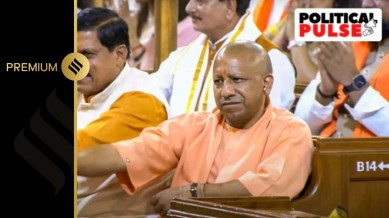The debacle in UP which shocked the BJP and contributed to its loss of majority in Lok Sabha has sent the party and its leaders, including Chief Minister Yogi Adityanath, back to the drawing board. The roles of party’s state and central leaders will also be under the scanner as the party undertakes an exercise to review the results.
Adityanath is learnt to have got the go-ahead from the leadership to begin the review during his two-day trip to New Delhi. He reached the Capital Thursday evening and had a meeting with senior leaders including party president J P Nadda.
After attending the NDA Parliamentary Party meeting Friday, Adityanath was said to have had another two-hour, closed-door meeting with the party leadership, where Prime Minister Narendra Modi, Union Ministers Amit Shah and Rajnath Singh were present, along with Nadda.
Among those whose roles will be under the scanner, and who are expected to submit detailed reports, are top ministers in the UP government and their colleagues who, along with the CM and Deputy CMs, were given the charge of separate districts last year to spread the message of the Modi government’s work.
Some of them were also tasked with managing caste equations in constituencies among Brahmins, Thakurs, Bhumihars, Baniyas and OBCs, in east, west and central UP regions.
Several BJP leaders have already begun talking openly about “internal sabotage”, apart from the failure to effectively counter the Opposition’s campaign around the “threat to the Constitution”, as well as “low turnout among Hindus”.
Story continues below this ad
BJP’s Rampur candidate Ghanshyam Singh Lodhi attributed his defeat mainly to “polarisation along religious lines”, and also accused some party leaders of “not cooperating”. “The party organisation has been informed about them. A detailed review is being done by the party and I,” he said.
Having wrested the SP stronghold in a 2022 bypoll, Lodhi lost this time to Mohibullah, a Delhi mosque cleric who was parachuted into the contest by the SP, by 87,000-plus votes. Lodhi’s vote share of 40.71% was even lower than the BJP’s share of 42.3% in 2019, when it was up against SP Rampur heavyweight Azam Khan.
On the main factor behind these numbers, Lodhi said: “The election was fought completely on caste and Hindu-Muslim lines.”
In Mohanlalganj (SC-reserved) seat, BJP’s Kaushal Kishore, a Union Minister of State in the outgoing Modi government, lost by 70,292 votes to SP’s R K Chaudhary. Admitting that the loss stunned him, Kishore accused “some party workers” of acting against him, adding that the leadership knew about them.
Story continues below this ad
Besides that, he blamed the INDIA bloc’s campaign that if the Modi government were to return, it would change the Constitution. The Congress also promised Rs 8,500 every month in the bank account of a woman from a poor family. The BSP’s core Jatav vote deserted the party for the SP-Congress alliance, Kishore said.
In the Shrawasti seat of eastern UP, local party leaders blamed “sabotage” by a former MP and influential BJP leader, saying he persuaded core BJP voters, including Brahmins and Kurmis, to vote against the party. The BJP candidate there was Saket Misra, son of Nripendra Misra, former principal secretary to the Prime Minister and chairman of the Ram temple construction committee. Saket lost by 76,673 votes to SP’s Ram Shiromani Verma, who had won the seat in 2019 on the BSP ticket.
BJP candidate Neelam Sonker who lost from the SC-reserved seat of Lalganj also blamed “sabotage” by local party office-bearers for her loss to SP’s Daroga Prasad Saroj by 1.15 lakh votes. She said the party organisation was aware that some leaders had “helped” the SP candidate.
A former MP, Sonker said the Opposition too was successful in driving home its message about the Constitution. “While the BSP got its Jatav votes, the Muslims did not vote for the BSP. In the past, Muslim votes would split between the SP and BSP, helping the BJP. But this time, all the Muslims voted for the SP.”
Story continues below this ad
BJP Sambhal candidate Parmeshwar Lal Saini attributed his loss to SP’s Zia Ur Rehman to consolidation of Muslim votes in support of the SP-Congress alliance and “low turnout of Hindu voters”. While Saini is an OBC leader, Rehman is the grandson of long-time former SP MP Shafiqur Rehman Barq, who passed away soon after the ticket was given to him.
Other seats where accusations have been made of party leaders contributing to the loss of the BJP candidates include those where Union ministers had been refielded – Kheri (Ajay Mishra ‘Teni’), Amethi (Smriti Irani), Fatehpur (Niranjan Jyoti), Chandauli (Mahendra Nath Pandey), and Muzaffarnagar (Sanjeev Kumar Balyan).
Sabotage allegations have also been made in Basti, Barabanki, Faizabad, Sultanpur, Allahabad, Kaushambi, Badaun, and Sitapur. In seats such as Kheri, Muzaffarnagar, and Fatehpur, local MLAs and office-bearers have been accused of not even stepping out to campaign for the candidates due to personal or local reasons.
